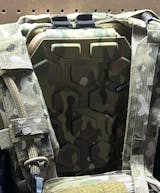Concealed Carry: The Benefit of Asking “What If?” Before a Potential Use of Force Situation

The following article is by one of our longtime customers, Gunnar Anderson. Enjoy!
- Justin
///START GUEST ARTICLE///
Should I draw my firearm? Should I shoot? Should I do nothing? You need to process the answers to these questions in seconds if you ever find yourself in a situation where deadly force may be necessary. In previous articles I covered what happens after you are involved in a use of force incident and the benefits of asking “what if?” before you are faced with such a decision. Here is a scenario based on an experience of mine while I was a prosecutor in California. What would you do?

You are at the grocery store with your wife and infant. You hear a commotion at the end of the next aisle, and as you round the corner you see a homeless man fighting with an employee over bottles of alcohol that he has tried to conceal in his backpack. You determine within two seconds that the homeless person is not armed but that this is a robbery because he is using force or fear to try to accomplish the theft. You are armed, and you and your family do not appear to be in any immediate danger at the opposite end of the aisle. What do you do?
- Draw your firearm and shoot the homeless person because deadly force is authorized to stop a violent felony. (A violation of California Penal Code 211 [Robbery] is considered a violent felony, even if a firearm is not involved.)
- Draw your firearm and attempt to effectuate a citizen’s arrest.
- Leave your firearm holstered but attempt to help the employee prevent the theft by non-lethal means and subdue the homeless person.
- Stay by your family and monitor the situation to see whether it escalates or resolves. You focus on keeping your family safe and being a good witness for the police but continuously reevaluate the scenario as it unfolds.
If you answered by selecting any of the first three options, why? Why is it a reasonable use of force? Why was your use of force proportional to the threat to the grocery store employee? If your justification cites to the finer points of the law and what is technically legal, then you may or may not be fine in the long term. In the short term, your life is going to be difficult.
When I lived this scenario, I chose to stay by my family and left my 1911 in its holster. I am wiling to take another human’s life under certain circumstances, but I have no burning desire to do so. I do not want to subject my family to the trauma of seeing me take another’s life unless it is absolutely necessary. I do not want to get handcuffed and booked into jail. I do not want to incur the massive legal expenses associated with defending a criminal and/or a civil case. I do not want to risk my job, house, economic future or personal liberty unnecessarily. I am not a peace officer, but I was a good witness when the city’s finest arrived on the scene shortly thereafter and arrested the robber. And to demonstrate the benefit of “what if?” - this was almost the exact scenario discussed at a firearms course I had previously attended. Thanks to asking “what if?” long beforehand, it was the best gunfight I never had.
Maybe you have been in a similar situation and chose differently. If so, how did your story end, and with the benefit of hindsight, would you choose differently? At the end of the day, think about the “what ifs” of similar fact patterns and how you would respond. Future you may be very thankful for investing the time to think about these scenarios now.
Gunnar Anderson is a former EMT, rescue diver, and prosecutor who now trains and advises both law enforcement and emergency management. Nothing in this article should be construed as legal advice - it is meant to encourage discussion and thoughtful planning.
///END GUEST ARTICLE///






Leave a comment